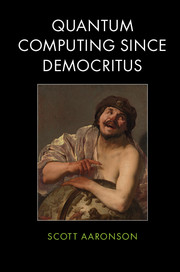Book contents
- Frontmatter
- Dedication
- Contents
- Preface
- Acknowledgments
- 1 Atoms and the void
- 2 Sets
- 3 Gödel, Turing, and friends
- 4 Minds and machines
- 5 Paleocomplexity
- 6 P, NP, and friends
- 7 Randomness
- 8 Crypto
- 9 Quantum
- 10 Quantum computing
- 11 Penrose
- 12 Decoherence and hidden variables
- 13 Proofs
- 14 How big are quantum states?
- 15 Skepticism of quantum computing
- 16 Learning
- 17 Interactive proofs, circuit lower bounds, and more
- 18 Fun with the Anthropic Principle1
- 19 Free will
- 20 Time travel
- 21 Cosmology and complexity
- 22 Ask me anything
- Index
1 - Atoms and the void
Published online by Cambridge University Press: 05 April 2013
- Frontmatter
- Dedication
- Contents
- Preface
- Acknowledgments
- 1 Atoms and the void
- 2 Sets
- 3 Gödel, Turing, and friends
- 4 Minds and machines
- 5 Paleocomplexity
- 6 P, NP, and friends
- 7 Randomness
- 8 Crypto
- 9 Quantum
- 10 Quantum computing
- 11 Penrose
- 12 Decoherence and hidden variables
- 13 Proofs
- 14 How big are quantum states?
- 15 Skepticism of quantum computing
- 16 Learning
- 17 Interactive proofs, circuit lower bounds, and more
- 18 Fun with the Anthropic Principle1
- 19 Free will
- 20 Time travel
- 21 Cosmology and complexity
- 22 Ask me anything
- Index
Summary
I would rather discover a single cause than become king of the Persians.
– DemocritusSo why Democritus? First of all, who was Democritus? He was this Ancient Greek dude. He was born around 450 BC in this podunk Greek town called Abdera, where people from Athens said that even the air causes stupidity. He was a disciple of Leucippus, according to my source, which is Wikipedia. He's called a “pre-Socratic,” even though actually he was a contemporary of Socrates. That gives you a sense of how important he's considered: “Yeah, the pre-Socratics – maybe stick ’em in somewhere in the first week of class.” Incidentally, there's a story that Democritus journeyed to Athens to meet Socrates, but then was too shy to introduce himself.
Almost none of Democritus’s writings survive. Some survived into the Middle Ages, but they’re lost now. What we know about him is mostly due to other philosophers, like Aristotle, bringing him up in order to criticize him.
So, what did they criticize? Democritus thought the whole universe is composed of atoms in a void, constantly moving around according to determinate, understandable laws. These atoms can hit each other and bounce off, or they can stick together to make bigger things. They can have different sizes, weights, and shapes – maybe some are spheres, some are cylinders, whatever. On the other hand, Democritus says that properties like color and taste are not intrinsic to atoms, but instead emerge out of the interactions of many atoms. For if the atoms that made up the ocean were “intrinsically blue,” then how could they form the white froth on waves?
- Type
- Chapter
- Information
- Quantum Computing since Democritus , pp. 1 - 7Publisher: Cambridge University PressPrint publication year: 2013



